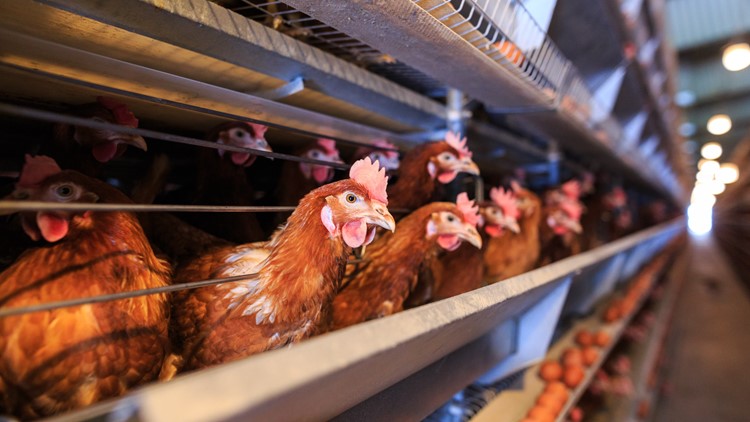NEWAYGO COUNTY, Mich. — The highly pathogenic avian influenza (HPAI) has been detected in a Newaygo County commercial poultry flock, according to the Michigan Department of Agriculture and Rural Development (MDARD).
This is the first time HPAI has been detected in Newaygo County, but the seventh time Michigan has seen an HPAI infection in a commercial poultry facility since 2022.
The facility is currently being quarantined, and poultry will be depopulated to prevent the spread of HPAI and ensure the safety of the commercial food supply.
"MDARD is addressing this outbreak from every angle, including working to help mitigate the economic impacts on local communities," said MDARD Director Tim Boring. "We remain laser-focused on our mission to protect animal and public health.”
HPAI is highly contagious and can be spread through wild birds, contact with infected poultry, equipment and on caretakers' shoes and clothes.
HPAI can also spread to other animals. Dairy herds in Ionia, Isabella and Ottawa counties were found to be infected with HPAI last week.
Farmers and anyone with flocks are encouraged to take precautions to avoid HPAI spreading to their birds.
“Taking preventative measures to keep wild birds away from farms is essential to combatting HPAI and limiting its impact,” said State Veterinarian Dr. Nora Wineland, DVM, MS, DACVPM. “As wild birds continue to migrate and the outside temperatures remain cool and temperate, conditions are ideal for the virus to spread. This is why it is so vital for producers to assess the risks on their premises and tighten protocols. Protecting animal health is of the utmost importance.”
MDARD says the following precautions should be taken:
- Prevent contact between domestic and wild birds by bringing them indoors or ensuring their outdoor area is fully enclosed.
- Wash your hands before and after handling birds as well as when moving between different coops.
- Disinfect boots and other gear when moving between coops.
- Do not share equipment or other supplies between coops or other farms.
- Clean and disinfect equipment and other supplies between If it cannot be disinfected, discard it.
- Use well or municipal water as drinking water for birds.
- Keep poultry feed secure to ensure there is no contact between the feed/feed ingredients and wild birds or rodents.
Bird owners and commercial poultry caretakers should watch for any symptoms of HPAI in their flocks, including sudden deaths, a drop in egg production, a significant decrease in water consumption, diarrhea, sneezing or coughing, or an increase in sick birds.
If you suspect a domestic or commercial flock has HPAI, you should call MDARD immediately at 800-292-3939 during the day or 517-373-0440 after hours.
If you suspect a wild bird of having HPAI, call the DNR Wildlife Disease Laboratory at 517-336-5030.
►Make it easy to keep up to date with more stories like this. Download the 13 ON YOUR SIDE app now.
Have a news tip? Email news@13onyourside.com, visit our Facebook page or Twitter. Subscribe to our YouTube channel.
Watch 13 ON YOUR SIDE for free on Roku, Amazon Fire TV Stick, and on your phone.



